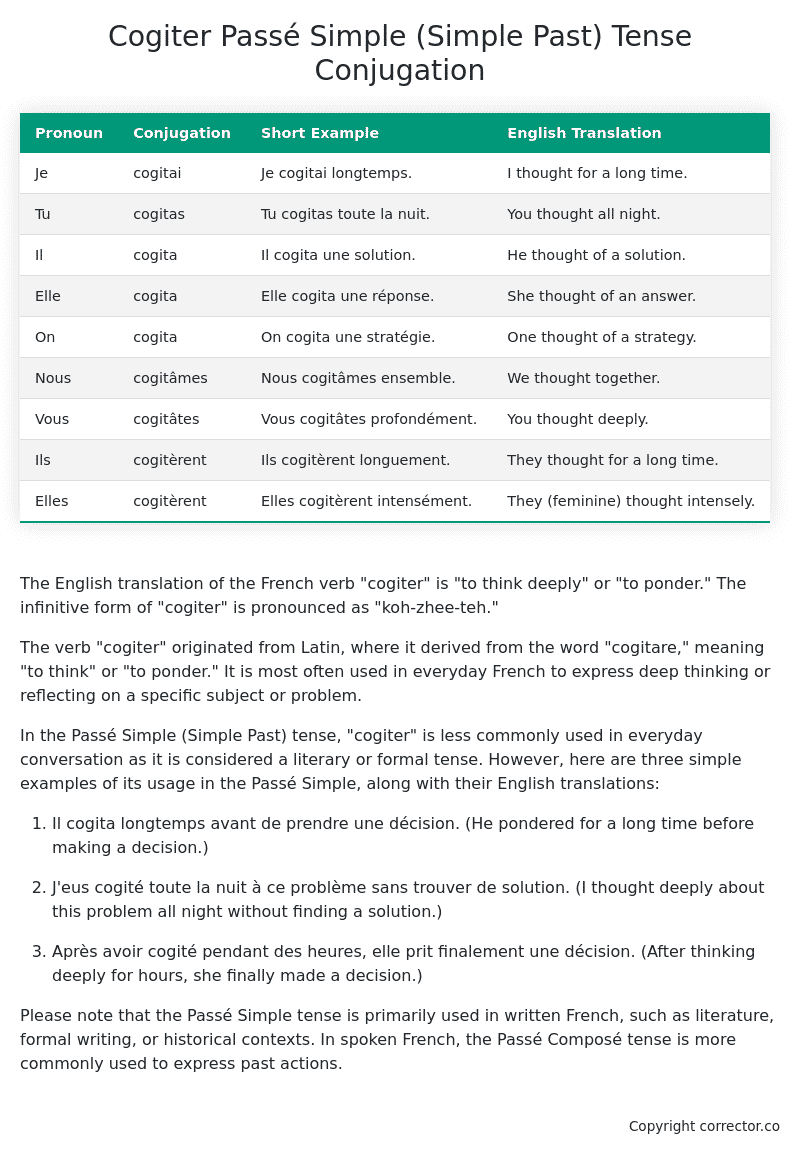Passé Simple (Simple Past) Tense Conjugation of the French Verb cogiter
Introduction to the verb cogiter
The English translation of the French verb “cogiter” is “to think deeply” or “to ponder.” The infinitive form of “cogiter” is pronounced as “koh-zhee-teh.”
The verb “cogiter” originated from Latin, where it derived from the word “cogitare,” meaning “to think” or “to ponder.” It is most often used in everyday French to express deep thinking or reflecting on a specific subject or problem.
In the Passé Simple (Simple Past) tense, “cogiter” is less commonly used in everyday conversation as it is considered a literary or formal tense. However, here are three simple examples of its usage in the Passé Simple, along with their English translations:
-
Il cogita longtemps avant de prendre une décision.
(He pondered for a long time before making a decision.) -
J’eus cogité toute la nuit à ce problème sans trouver de solution.
(I thought deeply about this problem all night without finding a solution.) -
Après avoir cogité pendant des heures, elle prit finalement une décision.
(After thinking deeply for hours, she finally made a decision.)
Please note that the Passé Simple tense is primarily used in written French, such as literature, formal writing, or historical contexts. In spoken French, the Passé Composé tense is more commonly used to express past actions.
Table of the Passé Simple (Simple Past) Tense Conjugation of cogiter
| Pronoun | Conjugation | Short Example | English Translation |
|---|---|---|---|
| Je | cogitai | Je cogitai longtemps. | I thought for a long time. |
| Tu | cogitas | Tu cogitas toute la nuit. | You thought all night. |
| Il | cogita | Il cogita une solution. | He thought of a solution. |
| Elle | cogita | Elle cogita une réponse. | She thought of an answer. |
| On | cogita | On cogita une stratégie. | One thought of a strategy. |
| Nous | cogitâmes | Nous cogitâmes ensemble. | We thought together. |
| Vous | cogitâtes | Vous cogitâtes profondément. | You thought deeply. |
| Ils | cogitèrent | Ils cogitèrent longuement. | They thought for a long time. |
| Elles | cogitèrent | Elles cogitèrent intensément. | They (feminine) thought intensely. |
Other Conjugations for Cogiter.
Le Present (Present Tense) Conjugation of the French Verb cogiter
Imparfait (Imperfect) Tense Conjugation of the French Verb cogiter
Passé Simple (Simple Past) Tense Conjugation of the French Verb cogiter (You’re reading it right now!)
Passé Composé (Present Perfect) Tense Conjugation of the French Verb cogiter
Futur Simple (Simple Future) Tense Conjugation of the French Verb cogiter
Futur Proche (Near Future) Tense Conjugation of the French Verb cogiter
Plus-que-parfait (Pluperfect) Tense Conjugation of the French Verb cogiter
Passé Antérieur (Past Anterior) Tense Conjugation of the French Verb cogiter
Futur Antérieur (Future Anterior) Tense Conjugation of the French Verb cogiter
Subjonctif Présent (Subjunctive Present) Tense Conjugation of the French Verb cogiter
Subjonctif Passé (Subjunctive Past) Tense Conjugation of the French Verb cogiter
Subjonctif Imparfait (Subjunctive Imperfect) Tense Conjugation of the French Verb cogiter
Subjonctif Plus-que-parfait (Subjunctive Pluperfect) Tense Conjugation of the French Verb cogiter
Conditionnel Présent (Conditional Present) Tense Conjugation of the French Verb cogiter
Conditionnel Passé (Conditional Past) Tense Conjugation of the French Verb cogiter
Conditionnel Passé II (Conditional Past II) Tense Conjugation of the French Verb cogiter
L’impératif Présent (Imperative Present) Tense Conjugation of the French Verb cogiter
L’impératif Passé (Imperative Past) Tense Conjugation of the French Verb cogiter
L’infinitif Présent (Infinitive Present) Tense Conjugation of the French Verb cogiter
L’infinitif Passé (Infinitive Past) Tense Conjugation of the French Verb cogiter
Le Participe Présent (Present Participle) Tense Conjugation of the French Verb cogiter
Le Participe Passé (Past Participle) Tense Conjugation of the French Verb cogiter
Struggling with French verbs or the language in general? Why not use our free French Grammar Checker – no registration required!
Get a FREE Download Study Sheet of this Conjugation 🔥
Simply right click the image below, click “save image” and get your free reference for the cogiter Passé Simple tense conjugation!

Cogiter – About the French Passé Simple (Simple Past) Tense
Formation
Usage
Narration
Historical Context
Interactions with other tenses
Passé Composé
Imparfait
Conditional and Subjunctive
Summary
I hope you enjoyed this article on the verb cogiter. Still in a learning mood? Check out another TOTALLY random French verb conjugation!


